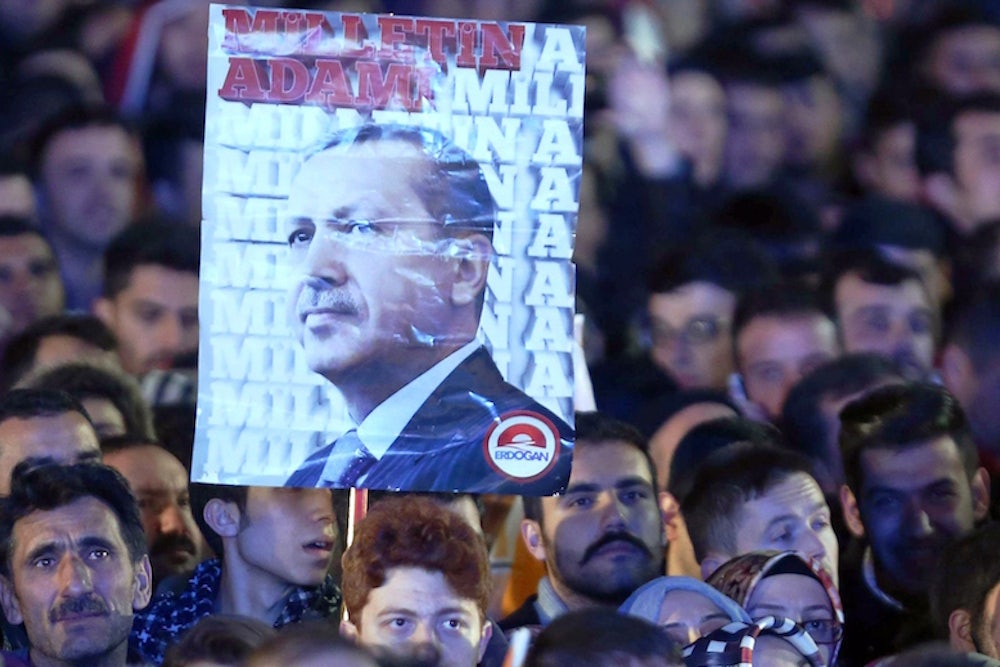These days, the best way to not understand what is happening in Turkey is to listen to the growing army of Turkey experts, columnists, and commentators who make a living analyzing a country that remains obscure to so many. The result of Sunday's snap elections, which saw President Recep Tayyip Erdogan's conservative Justice and Development Party (AKP) return to power with a convincing victory, took many non-specialists by surprise, partly because of the numerous columns published in the last year that promised a swiftly approaching end to conservative rule.
In the week following the general elections in June, which ended in an electoral stalemate, every rooftop in Istanbul's bohemian Cihangir neighborhood, where I live, echoed with cheerful predictions that it was all downhill for the AKP and for Erdogan's Islamist brand of politics. The great coalition of Turkey's angry people would soon bring about hope and change, people said. In a few months' time, Turkey would be a new country.
But on Sunday evening, I watched Turkey's conservatives increase their share of the vote by five million people, on their way to winning nearly 50 percent of the vote. It is the biggest electoral win in their history. Conservatives seem to have taken votes from both the MHP—the Turkish nationalist party, which lost some two million votes since June—and the HDP, the left-wing party supportive of Kurdish rights, which was down by one million votes. AKP's success has been largely attributed to a shift in focus on maintaining law and order, following a devastating terrorist attack in October in Ankara that killed scores of people and a renewal of government hostilities against militants of the Kurdistan Workers' Party (PKK).
But the result, in many ways, remains inexplicable to those who predicted Erdogan's demise. On Monday morning, on my way to a BBC radio interview, I was struggling to make sense of these numbers when I met a journalist friend in the subway. She almost came to tears while describing her painful experience of watching the election night on the television.
"When will the party I VOTE FOR start to win elections?" she wondered loudly.
I noted that at least the HDP passed the ten percent threshold needed to enter parliament. That, surely, was something to be happy about? Back in 1999, the year when I cast my first vote in a Turkish election, the leftist party of my choice, whose leader, Ufuk Uras, quoted passages by the Nobel-winning novelist Orhan Pamuk in his speeches, got 0.8 percent of the vote, while xenophobic and statist parties won a majority in parliament. But despite the great advances the left has made in Turkey in the past decade, my friend was still inconsolable, as were many others I met that day.
My friend's failure to comprehend the feelings and thoughts of the people who form the bulk of the AKP's support—voters who are by and large more religious and conservative—is indicative of the Turkish press as a whole. Among journalists, the ignorance of the public is almost a given. The poor and the conservative sections of society are seen as an army of ignorant people suffering from malnutrition, their political instincts honed by a set of fascistic impulses. Many columnists, seeing the society though this perspective, feel obliged to liberate Turkey, a task they believe can be accomplished by writing more newspaper columns.
Following the announcement of the results, some liberals were quick to announce their decision to leave the country and live in the civilized world. Others were furious about how stupid Turkey's people were. One compared conservative voters to the urban poor visiting farmers' markets late at night to buy rotten vegetables they can afford. Another compared them to victims of domestic violence who continue to live with their abusive spouses: Turks, in other words, were masochists. A number of liberals announced they had given up belief in elections entirely. Since the people of Turkey were this ignorant, any minute spent with them on a public cause would be a wasted one.
English readers are lucky to have a vision of Turkey that counters the one offered by the international press. The protagonist of Orhan Pamuk's new book A Strangeness in My Mind is a street vendor named Mevlut Karatas, whose chief concern is to lead a safe, healthy, and happy life. Having migrated to Istanbul from a poor Anatolian town, Mevlut works on Istanbul's labyrinthine streets from an early age. He is a good representative of the Turkish homo economicus: an essentially self-interested figure, Mevlut seeks to maximize his profits. The things he wants from life are not so outrageous: a house to live in, a peaceful country where he can sell his offerings, and a bit of state support. For such people, who have no country to flee to and no rich family to support them, developments like the weakening of the Turkish lira, the constant bombings on the streets, and a prospective collapse of the economic system, did not come as good news. It was largely due to such economic and security concerns that people voted the way they did in Sunday's elections, which was basically a referendum between single-party rule and a coalition government.
From a century-old habit of censoring art and journalism, to the ruthless and systematic destruction of Turkey's natural habitat, this country's problems are far from being imaginary. But blaming the ordinary people for the ills they suffer is of little value. Anyone can hate the common men and women of Turkey—the difficult part is to understand them.
